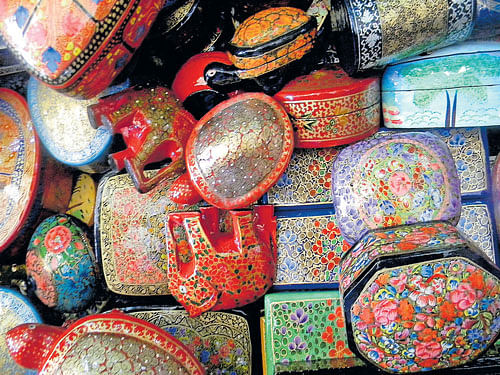
Forty-three-year-old Shabir Dehqani was one of the master craftsmen who displayed his artistry at the Design Haat conducted by Apeejay Institute, in Delhi.
Shabir Dehqani had come from Kashmir with his papier-mache products. He sat on the ground of his stall showing a painted papier-mache box to a few foreign students. He was pointing out the intricacies of the simple yet elegant craft of making the most with paper!
Listening to him talk about his family’s association with the craft was almost like flipping through the pages of history.
“We are originally from Persia where papier-mache has been used to manufacture small painted boxes, trays of all sorts, étagères, a piece of furniture with open shelves and cases,” he said.
He also informed his listeners that his family migrated to Kashmir in the 14th century. “There, our forefather, Raza Ali, started a papier-mache workshop and taught people this art form.”
Apparently, in those days, there was unemployment in the region and the craft Raza Ali taught enabled many to earn an income.
As I picked up a colourful papier-mache jewellery box, Shabir explained the process behind creating such elegant products. “First, the paper is turned into a pulp with water and glue, and then it is mashed. It is shaped after one’s choice and further smoothened. It’s in this final stage that colours and motifs are coated on it.”
Shabir informed that papier-mache is a French term that means “chewed paper”. “In Persia, bright colours are used to paint these products, and we have continued with this tradition. However, in the old days, only paper was used. But since 200 years now, we are also using wood and cardboard for our products,” he said of the craft’s evolution.
I looked at the sturdy products around me and it was really difficult to tell the paper products from the ones that were made of wood. Then Shabir revealed an interesting fact.
“Although papier-mache is a French term, the craft originated in China!”
Amrit Das, senior faculty at the fashion design department of the institute, said, “Shabir Husain and the other craftsmen from different domains that you see at the mela are master craftsmen who have won national awards and have been practising their craft for at least 25 years now. We are trying to provide platform for them to interact with stakeholders at both the national and international levels. Through this, we hope to help them bring their crafts to a contemporary level, suited to the needs of the contemporary market, while keeping the intrinsic traditional essence of the craft alive.”